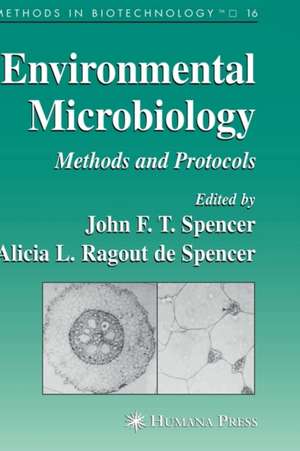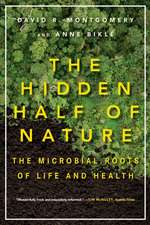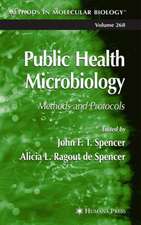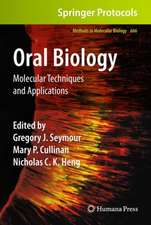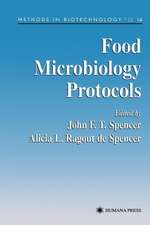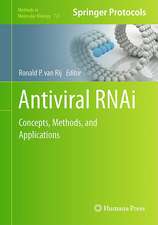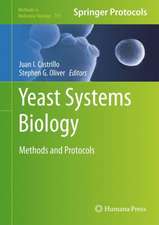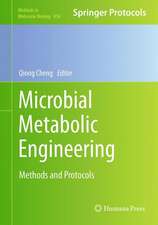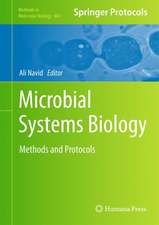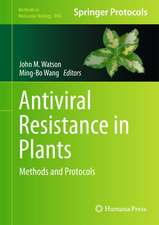Environmental Microbiology: Methods and Protocols: Methods in Biotechnology, cartea 16
Editat de John F. T. Spencer, Alicia L. Ragout de Spenceren Limba Engleză Hardback – 15 iul 2004
| Toate formatele și edițiile | Preț | Express |
|---|---|---|
| Paperback (1) | 952.26 lei 6-8 săpt. | |
| Humana Press Inc. – 9 dec 2010 | 952.26 lei 6-8 săpt. | |
| Hardback (1) | 954.14 lei 6-8 săpt. | |
| Humana Press Inc. – 15 iul 2004 | 954.14 lei 6-8 săpt. |
Din seria Methods in Biotechnology
- 15%
 Preț: 648.74 lei
Preț: 648.74 lei - 15%
 Preț: 656.43 lei
Preț: 656.43 lei - 15%
 Preț: 650.69 lei
Preț: 650.69 lei - 15%
 Preț: 639.90 lei
Preț: 639.90 lei - 18%
 Preț: 953.52 lei
Preț: 953.52 lei - 18%
 Preț: 969.93 lei
Preț: 969.93 lei - 18%
 Preț: 952.57 lei
Preț: 952.57 lei - 18%
 Preț: 963.15 lei
Preț: 963.15 lei - 18%
 Preț: 961.23 lei
Preț: 961.23 lei - 15%
 Preț: 652.31 lei
Preț: 652.31 lei - 15%
 Preț: 651.19 lei
Preț: 651.19 lei - 18%
 Preț: 953.52 lei
Preț: 953.52 lei - 18%
 Preț: 962.35 lei
Preț: 962.35 lei - 18%
 Preț: 955.56 lei
Preț: 955.56 lei - 15%
 Preț: 649.87 lei
Preț: 649.87 lei - 18%
 Preț: 964.71 lei
Preț: 964.71 lei - 15%
 Preț: 648.05 lei
Preț: 648.05 lei - 15%
 Preț: 632.66 lei
Preț: 632.66 lei - 15%
 Preț: 643.99 lei
Preț: 643.99 lei
Preț: 954.14 lei
Preț vechi: 1163.58 lei
-18% Nou
Puncte Express: 1431
Preț estimativ în valută:
182.60€ • 198.27$ • 153.38£
182.60€ • 198.27$ • 153.38£
Carte tipărită la comandă
Livrare economică 22 aprilie-06 mai
Preluare comenzi: 021 569.72.76
Specificații
ISBN-13: 9781588291165
ISBN-10: 1588291162
Pagini: 426
Ilustrații: XIV, 426 p.
Dimensiuni: 155 x 235 x 28 mm
Greutate: 0.69 kg
Ediția:2004
Editura: Humana Press Inc.
Colecția Humana
Seria Methods in Biotechnology
Locul publicării:Totowa, NJ, United States
ISBN-10: 1588291162
Pagini: 426
Ilustrații: XIV, 426 p.
Dimensiuni: 155 x 235 x 28 mm
Greutate: 0.69 kg
Ediția:2004
Editura: Humana Press Inc.
Colecția Humana
Seria Methods in Biotechnology
Locul publicării:Totowa, NJ, United States
Public țintă
ResearchCuprins
Communities and Biofilms.- Isolation and Molecular Characterization of Seawater Bacteria.- Reverse Sample Genome Probing to Monitor Microbial Communities.- T-RFLP Analysis.- Assessing Bacterial DNA Content in Aquatic Systems.- Multiplexed Identification and Quantification of Analyte DNAs in Environmental Samples Using Microspheres and Flow Cytometry.- Molecular Characterization of Microbial Communities From Marine Environments.- Yeasts.- Aeromonads in Environmental Waters.- Development of a Vital Fluorescent Staining Method for Monitoring Bacterial Transport in Subsurface Ground Water.- Bench Scale Flow Cell for Nondestructive Imaging of Biofilms.- Fermented Milks.- ?-Galactosidase Assay in Fermented Soymilk Products.- Considerations to Avoid the Overestimation of Exopolysaccharides Produced by Lactic Acid Bacteria.- Determination of Oligosaccharides in Fermented Soymilk Products by High-Performance Liquid Chromatography.- Evaluation of Minimal Nutritional Requirements of Lactic Acid Bacteria Used in Functional Foods.- Nuclei Acids, Recovery, and Determination.- A Simple Method for Obtaining DNA Suitable for RAPD Analysis From Azospirillum.- PCR Fingerprinting of rRNA Intergenic Spacer Regions for Molecular Characterization of Environmental Bacteria Isolates.- A DNA-DNA Hybridization Method for the Detection and Quantification of Specific Bacterial Taxa in Natural Environments.- 13C and 1H NMR Study of the Glycogen Futile Cycle in Fibrobacter succinogenes.- Chemical Analysis and Biological Removal of Wood Lipids Forming Pitch Deposits in Paper Pulp Manufacturing.- Propolis.- Enzymatic Saccharification of Cellulosic Materials.- Molecular Identification of Microbial Populations in Petroleum-Contaminated Groundwater.- Identification of Copper-Resistant Microorganisms byPCR.- Selection of Tolerant Heavy Metal Yeasts From Different Polluted Sites.- Medium for Differential Enumeration of Lactobacillus casei and Lactobacillus acidophilus From Lyophilized Mixed Cultures.- Silk as a Means of Recovering Bacteriocin From a Culture Medium.- Optimization of a Method for Isolating Plasmid DNA From Lactic Acid Bacteria From Wine.- Simultaneous and Sequential Methods to Study Interactions Between Yeast and Lactic Acid Bacteria From Wine.- Method for Determining Lindane Concentration in Water and Solid Samples.- Extracellular Hydrolytic Enzymes Produced by Yeasts.- Extracellular Hydrolytic Enzymes Produced by Phytopathogenic Fungi.- An Analysis of Microorganisms in Environments Using Denaturing Gradient Gel Electrophoresis.- Testing for Evolutionary Correlations in Microbiology Using Phylogenetic Generalized Least Squares.- Conjugated Linoleic Acid Detection Produced by Dairy Starter Cultures.- Reviews.- Techniques for Manipulating the Bacterial Endophyte Bacillus mojavensis.- Engineering of Bacteria Using the Vitreoscilla Hemoglobin Gene to Enhance Bioremediation of Aromatic Compounds.- The Use of Chemical Shift Reagents and 23Na NMR to Study Sodium Gradients in Microorganisms.- Denaturing Gradient Gel Electrophoresis (DGGE) as a Fingerprinting Tool for Analyzing Microbial Communities in Contaminated Environments.
Textul de pe ultima copertă
Understanding the relationship between a microorganism and its environment is essential to the successful manipulation of industrial, biochemical, and medical processes. In Environmental Microbiology: Methods and Protocols, highly practiced experimentalists who often have perfected the methods they write about describe readily reproducible techniques for determining most of the important factors governing microorganisms and their habitats. Presented in step-by-step detail, these cutting-edge methods range from those for the study of marine organisms, to those for investigating microorganisms occurring in groundwater, to the biodiversity found in remote environments. The protocols for studying fermented milks are significant for investigators concerned with milk as an item of food for infants, small children, and even adults. Additional methods for the recovery and determination of nucleic acids and other compounds affecting, and affected by, microorganisms, are provided for certain enzymes produced by plant pathogens and for obtaining microbial species tolerant of such inhibitors as heavy metals. Review articles discuss the endophytic bacterium Bacillus mojavensis, the engineering of bacteria to enhance their ability to carry out bioremediation of aromatic compounds, and the use of chemical shift reagents and Na-NMR to study sodium gradients in microorganisms. The protocols follow the successful Methods in Molecular Biology™ series format, each one offering step-by-step laboratory instructions, an introduction outlining the principle behind the technique, lists of equipment and reagents, and tips on troubleshooting and avoiding known pitfalls.
State-of-the-art and highly practical, Environmental Microbiology: Methods and Protocols offers microbiological researchers a powerful set of techniques for investigating and understanding microorganisms in their native environments.
State-of-the-art and highly practical, Environmental Microbiology: Methods and Protocols offers microbiological researchers a powerful set of techniques for investigating and understanding microorganisms in their native environments.
Caracteristici
Includes supplementary material: sn.pub/extras
